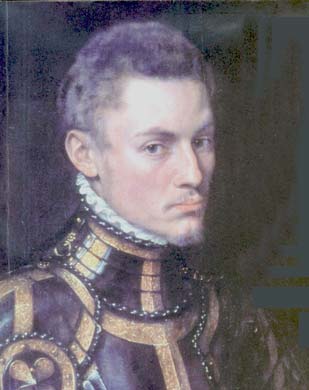Regent of Holland, Soldier, Martyr
July 10 1584
William of Orange the First


Almighty God, whose servant William the Silent gave his life for his Christian faith and country; make us mindful of his purpose to quell religious strife and persecution, and to gain freedom for his fellow citizens. Grant that we, like William, might always seek a spirit of charity, forbearance, and cooperation amongst Christian sects; through Jesus Christ our Lord, who liveth and reigneth with thee and the Holy Ghost, one God, world without end. Amen
So named the "Silent" because he was reticent concerning controversial matters for the sake of peace - specifically when King Henry of France divulged a plan to William, as he was being held hostage by Henry in 1559, to slaughter all protestants as part of a secret treaty. "William of Orange, who—even more than Elizabeth of England, and quite as much as Henry of Navarre—placed peace, order, and religious compromise above any question of Bible, doctrine, or worship."
When William was 11, he was named by his cousin, who had no descendents, as Prince of Orange and given large holdings. Charles V of Spain sent William to Brussels to study under the supervision of Maria of Austria, the sister of Charles V and regent of the Habsburg Netherlands (Seventeen Provinces). In Brussels, he learned foreign languages and received a military and diplomatic education. In 1551 he was appointed Captain of Cavalry, and by age 22 commanded an Army. The following is from WILLIAM THE SILENT by Frederic Harrison.
******
"The man who inspired, founded, and made possible the [formation and independence of Holland] was William, Count of Nassau, titular Prince of Orange, surnamed the Silent. The eloquent epigram of Voltaire records the result of his achievement. His career, like his nature and his circumstances, was made up of anomalies and filled with complex elements. The man who organised the national rebellion of Holland, by birth a German count, became by inheritance a Flemish magnate and a sovereign prince. A Lutheran by family, he was brought up a Catholic, and died a Calvinist. His early years were passed as a soldier and minister of the Empire, as ambassador and lieutenant of the King of Spain, and as a grandee of boundless magnificence. Himself the mainspring of a national and religious insurrection, his best energies were spent in moderating the political and religious passions which were at once the cause and the result of the struggle. Personally a devout man, he professed in succession all the three great forms of Christian belief, whilst steadily opposing all that was extreme and all that was violent in each. His memory is still passionately cherished in his adopted fatherland: first as the founder of an illustrious Commonwealth, then as the father of a long line of able statesmen and ruling princes, and finally as a martyr to the cause of national independence and liberty of conscience."
Pontus Payen, a sincere Catholic, loyalist, said of him, "As to religion, he behaved with such discretion that the most close observers could not decide which way he inclined. The Catholics thought him a Catholic; the Lutherans, a Lutheran. He heard mass daily, whilst his wife and his daughter made public profession of the Lutheran heresy, even in his presence, without any objection from him. He condemned the rigidness of our theologians in maintaining the constitutions of the Church without making a single concession to the Reformers. He blamed the Calvinists as provoking sedition and strife, yet he spoke with horror of the edict of the Emperor that sentenced them to death, for he held it to be cruelty to kill any man simply for maintaining an erroneous opinion. He used to say that in all matters of religion, punishment should be reserved to God alone, much as the rude German who said to the Emperor, “Sire, your concern is with the bodies of your people, not with their souls.” In short, the Prince would have liked to see established a fancy kind of religion of his own, half-Catholic half-Lutheran, which would satisfy both sides. Indeed, if you look at his inconsistency on religious questions, as shown in his speeches and despatches, you will see that he put the State as something above the Christian religion, which in his eyes was a political invention to keep the people steady to their duty by the fear of God, so that orthodoxy was to him neither more nor less than the ceremonies, divinations, and superstitions that Numa Pompilius introduced in old Rome to tame the fierce and too warlike temper of his Romans."
In the last ten years of his life, William was dogged by assassins promoted by Philip of Spain. One nearly finished him, but miraculously he held on. He said,
I have heard that tomorrow they are to execute the two prisoners, the accomplices of him who shot me. For my part, I most willingly pardon them. If they are thought deserving of a signal and severe penalty, I beg the magistrates not to put them to torture, but to give them a speedy death, if they have merited this. Good-night!
******
Two years later fate caught up with Prince William. An assassin, a person who he trusted, hid in the shadows shot him in his home on On 10th July 1584.
As a Captain serving in Germany in 1980, I was privileged to visit First Church, in Delft, and there to see the Mausoleum of the Prince of Orange. Mark Carroll, Primus Pilus.
William the Silent by Frederic Harrison